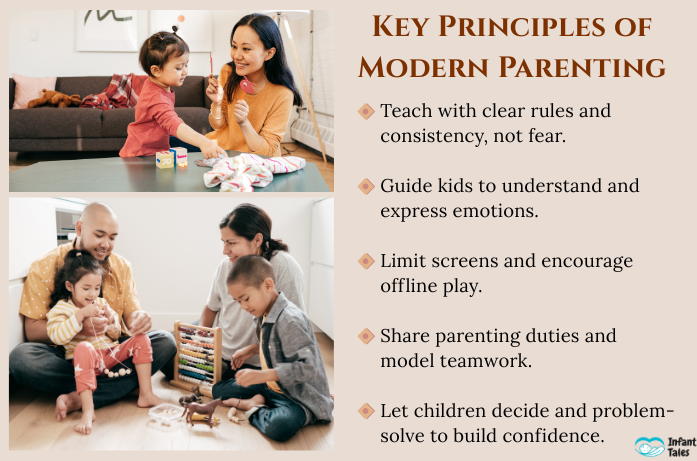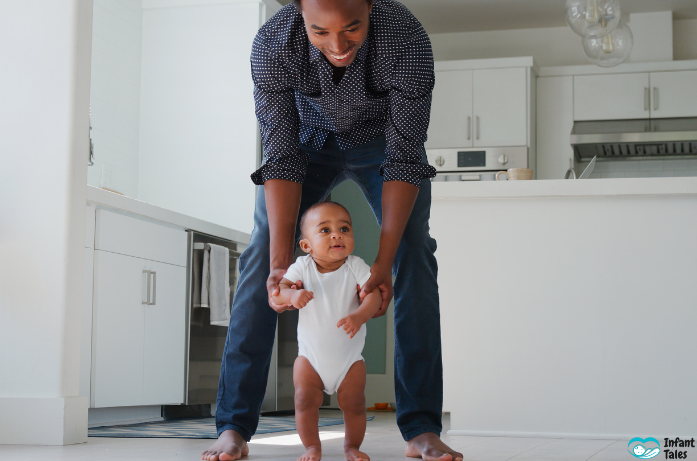By a caring mom at Infant Tales
Parenting is love; parenting has its challenges; parenting demands constant learning. Every challenge and phase requires patience and the ability to adapt. However, parents today have been offered a shockingly different world compared to what parents of even the preceding generation had known. Rapid technological progress, novel family structures, consciousness about child psychology, and changing cultural expectations have spawned a new paradigm often called modern parenting. This approach overlaps with ideas like gentle parenting, positive parenting, and conscious parenting, but it’s shaped by today’s unique challenges.
So, what exactly is modern parenting? How does it differ from traditional parenting styles, and how can new parents or caregivers learn from this shift? Here, we’ll delve into the core of modern parenting, the structure, philosophy, and challenges of modern parenting, as well as practical tips to help you raise children with confidence, kindness, and a balanced mindset in this fast-paced world.
Defining Modern Parenting
Modern parenting combines a bit of the old and a bit of the new. It still emphasizes love, discipline, and responsibility, but also brings in emotional intelligence, communication, and flexibility. According to research like the WHO’s Guidelines on Parenting Interventions to Prevent Maltreatment and Enhance Parent-Child Relationships (2023), parenting styles that reduce harsh control and enhance responsiveness lead to better emotional outcomes for children. In stark contrast to authoritarianism, modern parenting embraces a degree of individuality by respecting the child’s voice and guiding, as much as possible, rather than controlling them.
Modern parenting is:
- Responsive: Paying close attention to a child’s physical and emotional needs. (Inspired by John Bowlby’s attachment theory)
- Flexible: Adapting parenting techniques to suit the individual personality of the child.
- Connected: Forming relationships of empathy and communicating.
- Balanced: Providing a balance between authority and independence as well as freedom and creativity.
How Modern Parenting Differs from Traditional Parenting
Traditional parenting used to employ something like a “top-down” system, where decisions were taken purely by the parents alone-the child rarely had a say-and the emphasis of discipline was largely on obedience and strictness. While this approach found applicability in many homes in the past, today is a different world in which children are growing up.
Here’s a simple comparison:
| Aspect | Traditional Parenting | Modern Parenting |
| Discipline | Strict, rule-focused, expects obedience. | Gentle guidance, clear rules with respect. |
| Communication | Parents talk, children listen. | Open dialogue, children’s voice matters. |
| Education | Academics above all else. | Academics plus creativity and emotions. |
| Technology | Rarely involved in childhood. | Everyday tool, needs balance and limits. |
| Role of Parent | Authority figure, final say. | Guide, mentor, supportive partner. |

Key Principles of Modern Parenting
1. Gentle Discipline Over Harsh Punishments
Modern day parents employ positive discipline, clear rules, consistent consequences, and rewards for desired behavior. According to the American Academy of Pediatrics (AAP), these approaches set a premise for life lessons in responsibility without fear and allow the child to feel secure and respected.
2. Emotional Intelligence Matters
Today, the emphasis is on child rearing with emotional awareness. Parents work with their kids to identify, express, and manage feelings, which build their resilience and empathetic capacity. Studies show that high emotional competence facilitates good mental health and learning. Studies, such as Parental Socialization of Emotion (PMC/NCBI), show that supportive parenting boosts children’s emotional and social competence.
3. Balance of Screen Time and Technology Use
So, technology is undoubtedly part of childhood, but it needs limits. If a family sets limits on screen time, picks the right kind of things to show to their kids, and encourages them to play in groups offline, then the children will be able to benefit from technology without being dragged down by an overindulgence.
4. Team-Based Parenting
Team parental partnership might be the ideal way to raise a child. Working side by side to share tasks reduces stress levels and helps set examples of cooperation for children so that they learn about sharing and teamwork.
5. Encouraging Independence and Critical Thinking
Rather than making decisions for their children, parents provide them with opportunities to address problems and make decisions from which children form confidence, curiosity, and agility, skills that the modern child needs.
The Challenges of Modern Parenting
1. Information Overload
Parents are usually left confused with advice coming at them from every direction online. Having a record of trusted sources and focusing on what applies to one’s child make good stress reducers. CDC child development milestones helps simplify parenting challenges and solutions.
2. Work-Life Balance
Maintaining a balance between jobs and families is tricky and leaves little room for resting. The ones small are daily rituals like eating together or listening to bedtime stories that make the moments together truly count.
3. Technology & Social Media
Daily heads up on children’s screen use and online safety are needed. Teaching digital responsibility from an early age makes technology a tool rather than a distraction.
4. Changing Family Structures
Today, families look different: a single parent, a blended home, or grandparents raising kids. Each working best in the presence of flexibility, support, and open communication.
5. Parental Pressure and Expectations
With social media and cultural comparisons, parents feel that they must be perfect. Remember, kids just need love, presence, and consistency, not perfection, as highlighted by UNICEF.
Practical Tips for Embracing Modern Parenting
1. Build a Strong Connection Every Day
These simple actions-the two of you reading a book together, talking at the dinner table, or sharing bedtime rituals-help in forming the attachment needed.
2. Set Boundaries with Love
Boundaries are about presenting structure, not control. If children know limits, they feel safe.
3. Model the Behavior You Want to See
Kids listen with their eyes and not ears. Be kind, patient, and respectful in everyday interactions.
4. Teach Digital Responsibility
Rather than banning technology, teach kids to use it properly and securely, such as encouraging creative use of the Internet instead of simply watching entertainment.
5. Practice Self-Care as a Parent
Modern parenting would have it that the mental state and the physical health of a parent are just as important. A calm and rested parent is capable of raising a happy child.
The Role of Culture and Society in Modern Parenting
Parenting methods have always been molded by culture and societal change. Some examples are:
- In some cultures, collective responsibility (extended family support) is still strong.
- In urban areas, parents may depend more on daycares and paid caregivers.
- These days, schools expect parents to get involved more in children’s academic and extracurricular activities.
With increasing awareness around mental health issues and ensuring equality and inclusiveness, parents today will have to inculcate respect for diversity, empathy, and acceptance in children. National Parenting Education Network (NPEN)
Why Modern Parenting Matters
Modern parenting essentially aims to raise children who are emotionally secure, independent thinkers, and empathetic human beings in an interconnected fast-changing world.
Modern parenting is not an overnight solution for raising perfect children; it is about doing it better, not perfectly. The journey will need a few mistakes; therefore, the power in it lies in the willingness to learn alongside the child.
A Gentle Reminder
While articles and expert advice help, always remember that every single family is unique. Parenting is not a “one-size-fits-all” concept; a method that works for one child may not work for another. Always take into consideration your child’s personality, needs, or circumstances.
If you feel some concern about an aspect of health, development, or behavior of your child, then it would be best to seek a pediatrician or child development specialist. This article merely intends to inform and provide basic guidance and should never be considered as a substitute for medical advice.
FAQs
Q1. What makes modern parenting different from traditional parenting?
Modern parenting focuses on empathy, communication, and flexibility. Instead of promoting strict obedience, it encourages helping children develop independence, emotional intelligence, and critical thinking.
Q2. How do I balance technology use with my child?
Set boundaries with screen time to maximize it; encourage use of educational or creative content; balance this with outdoor play; have them read books; and embrace family time.
Q3. Does gentle discipline work?
Yes. Gentle discipline fosters respect and responsibility without generating fear. It implies the use of clear rules of behavior, natural consequences, and positive reinforcement instead of punishment.
Q4. What if I cannot comply with every modern parenting principle?
Of course, it is okay. No parent is perfect. Modern parenting is therefore about making progress rather than about perfection. What really matters is consistency, love, and an adaptation to the needs of your child.
Q5. How can I stay calm and avoid burnout as a parent?
Make time for self-care, even if just in the smallest ways. Taking a few minutes for yourself, creating daily routines, or sharing some parenting duties with your partner, family, or a trusted caregiver all can turn what seems overwhelming into a manageable task.
Final Thoughts
Modern parenting is not about being perfect but being truly present, being adaptable, and being loving. It is about genuinely listening to your child, guiding them with affection, and getting them ready for a world where emotional being intelligence and respect are as valued as academic achievement.
We, as parents and caregivers, are forging the reimagined chapter in the ancient story of raising children, one that weaves the wisdom of tradition with modern scientific insight and psychology.
At Infant Tales, we feel that every parenting journey is unique, and with all the right information and support, you can cultivate an environment where your little one thrives.
Subscribe to Infant Tales for daily posts on modern parenting, baby care, and family well-being, packed with gentle tips, real-mom insights, and practical advice to make your parenting journey lighter and brighter.



